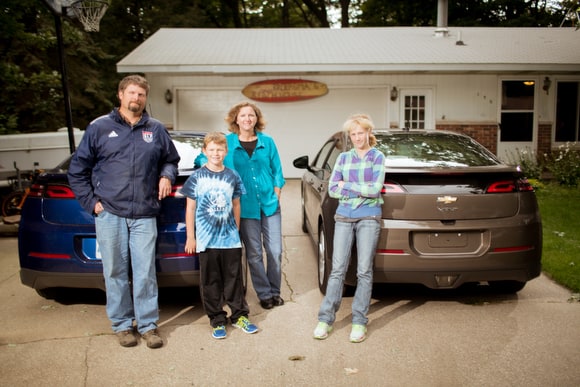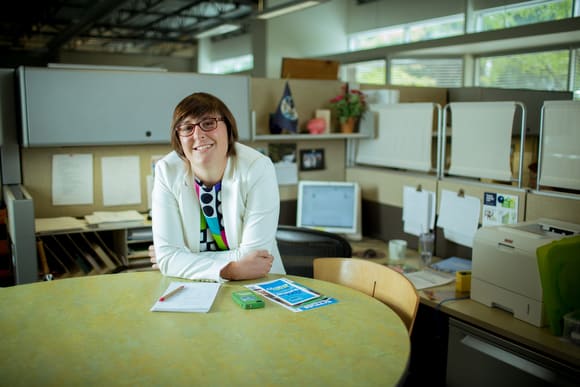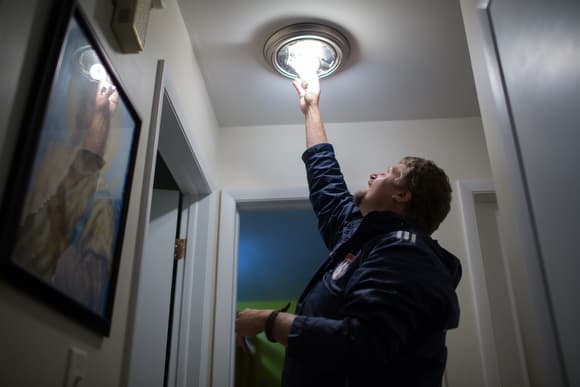
The Broersma family takes efficiency seriously. The global modernist furniture icon, Herman Miller, which is responsible for bringing the world the famed Eames Lounge Chair, is invested in far more than simply sitting in style and comfort. Since 1953, the manufacturing company has made it a mission to be “a good steward of the environment,” as declared by founder D. J. DePree.
In honor of that momentous year and DePree’s goals, a group at Herman Miller founded Team 53, which is “charged with reengaging our employees to bring their creative ideas forward to inspire others to build a better world,” according to the company’s website. In an effort to spearhead environmentally minded change across West Michigan and beyond, Team 53 partnered with the West Michigan Environmental Action Council (WMEAC) to offer deeply discounted home energy assessments, or audits, to employees of the company, and now has extended the program to friends and families of Herman Miller.
Anne Marie Hertl “WMEAC and Herman Miller have a long, really rich relationship,” says Anne Marie Hertl, community action manager at the West Michigan Environmental Action Council. “Since we are a regional organization it’s really important for us to have a presence on the lakeshore. Herman Miller is a natural fit and we find a lot of congruency between what their values are as a sustainable model and [there are] opportunities for us to help support them in becoming more sustainable.”
The Herman Miller Home Energy Assessment program launched in July 2013; “since then, out of 2,000 or so employees, we’ve had audits for around 135 people,” says Hertl. While she doesn’t have numbers on how many people have made improvements following the audits, Hertl explains that having the audit completed is just as important as taking steps to correct energy issues within a home. The process can give a larger picture of a home, its value and potential value, and even expose inferior craftsmanship in newer homes while highlighting significant improvement opportunities for older homes, plus it can highlight health risks like gas leaks.
“Energy efficiency is the cleanest, cheapest, most quickly deployed energy source that we have. At WMEAC we view energy efficiency as an untapped energy source,” says Hertl. Typically most assessments cost between $300 and $500. At a mere $49, the Home Energy Assessment Program is a boon to the local community in a way that reaches far beyond simply easing the financial burden of participants looking to enhance the efficiency of their homes.
 The assessment process is conducted by professional energy contractors who look at a house or building holistically, as a working system. Health dynamics of a home are also addressed in conjunction with efficiency concerns. “The same improvements to help improve asthma will be the same improvements [that create] energy savings,” says Hertl. Once the audit is complete, it is up to the homeowners to take action to implement positive change in their dwelling. Resources include a list of reputable contractors favored by WMEAC and low interest financing options are available through a partnership with the non-profit, Michigan Saves. Plus, homeowners are given plenty of do-it-yourself options for home improvement.
The assessment process is conducted by professional energy contractors who look at a house or building holistically, as a working system. Health dynamics of a home are also addressed in conjunction with efficiency concerns. “The same improvements to help improve asthma will be the same improvements [that create] energy savings,” says Hertl. Once the audit is complete, it is up to the homeowners to take action to implement positive change in their dwelling. Resources include a list of reputable contractors favored by WMEAC and low interest financing options are available through a partnership with the non-profit, Michigan Saves. Plus, homeowners are given plenty of do-it-yourself options for home improvement.
Daniel Broersma installs LED lights. Daniel Broersma, Design for the Environment corporate program manager at Herman Miller, is not only a member of Team 53, but is also a homeowner who benefited greatly from the home assessment program. “I bought a home on the south side of Holland near the beach,” he says. “It was built in the 60s or 70s, and was very drafty and not well insulated…We bought the home for the location, not the home itself.” Broersma says he had heard of energy audits before but felt the cost was too expensive to justify. Once the employee program was created at Herman Miller, he found that now, “it was very inexpensive and very practical.”
“After I had the audit done, I’ve been more vocal about it,” says Broersma. Partly because of some eye opening revelations, like learning that his oven “was on the verge of being unsafe.” Other findings were that some interior walls had been originally built like an exterior wall, which was discovered through infrared technology. “We found with very little effort the main cause of my energy loss throughout the house. It was pretty profound and I was pretty upset with the builders,” he says.
 Of the changes needed to improve his house, Broersma completed about half of the work himself and used contractors that the auditor recommended for the rest of the repairs. “Probably one of the most powerful things about the audit is that you have someone there who is actually showing you these [flaws],” he says. “And showing you what you can possibly save is a lot more motivating to get something fixed.” He also described the impact that the do-it-yourself fixes had on his home, like “the easy stuff that you can do to make an impact on your bills and your footprint.”
Of the changes needed to improve his house, Broersma completed about half of the work himself and used contractors that the auditor recommended for the rest of the repairs. “Probably one of the most powerful things about the audit is that you have someone there who is actually showing you these [flaws],” he says. “And showing you what you can possibly save is a lot more motivating to get something fixed.” He also described the impact that the do-it-yourself fixes had on his home, like “the easy stuff that you can do to make an impact on your bills and your footprint.”
Today, Broersma says his home is much more comfortable than it was before and that the cost savings were noticeable, especially during last year’s Polar Vortex.
Beyond the personal benefits, Broersma lauds his employer’s efforts toward sustainability. “I’ve never heard of this type of program within a corporation and I think it speaks to Herman Miller’s caring for not only its own employees, but the community in general. Especially where we live here in West Michigan, the sustainable atmosphere in the corporations and the individuals that are involved in it is kind of a beacon,” he says.
This piece was supported in part through a partnership with Michigan Saves and Public Sector Consultants.
Audria Larsen is a freelance writer, entrepreneur and professional entertainer. Her work has been published in Rapid Growth Media, Revue Magazine, Michigan Blue Magazine and Hooping.org. She is the founder of Audacious Hoops, Grand Rapids’ original “hula” hoop company and produces a myriad of art and entertainment ventures.
Photography by Adam Bird
This piece first appeared in Rapid Growth.

